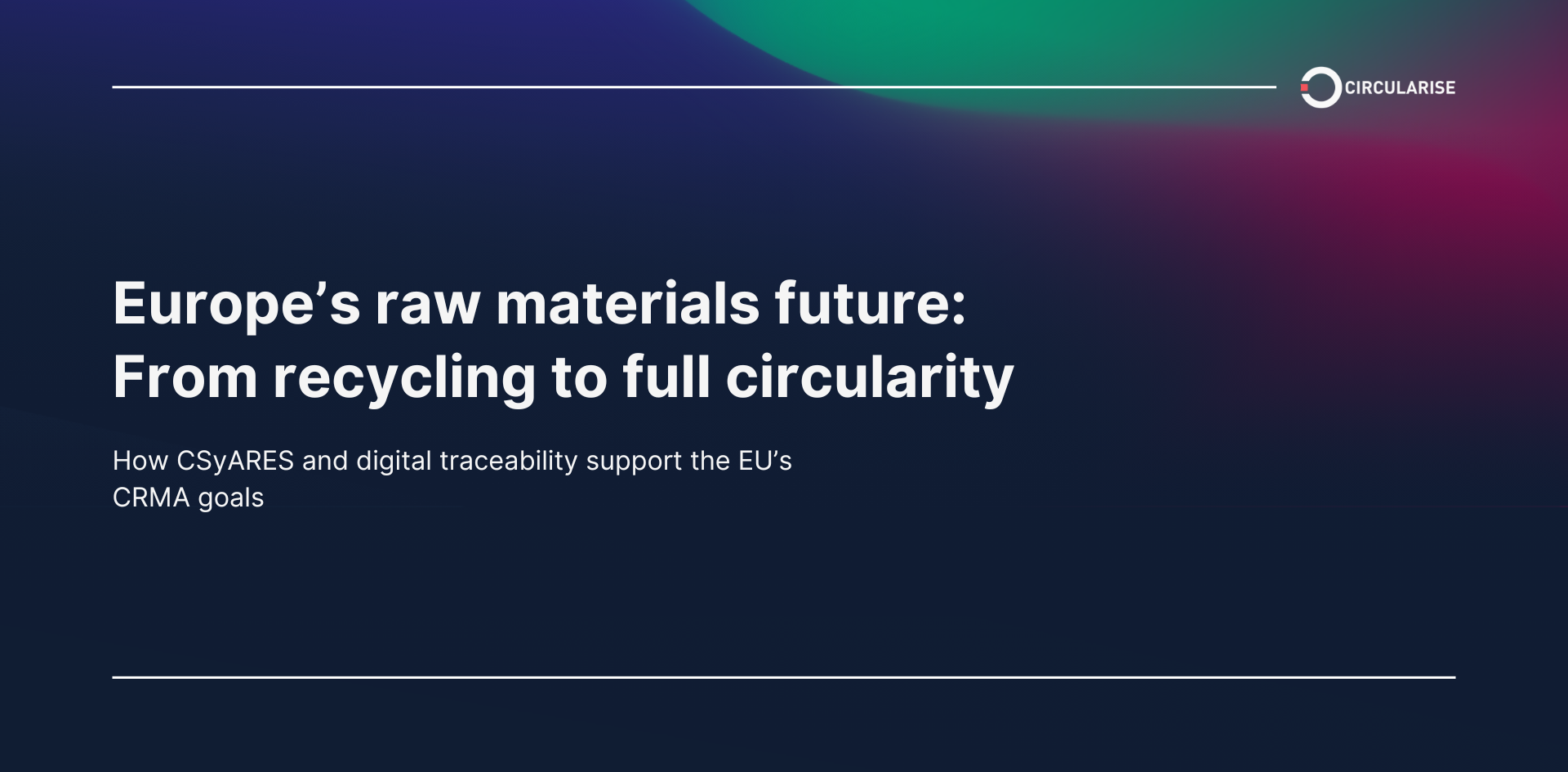Introduction
Circularise is a pioneering platform that focuses on strengthening traceability in supply chains to increase transparency, sustainability, and responsible business practices. As industries face increasing pressure to adopt more eco-friendly and ethical practices, the need for a reliable, trustworthy solution has become paramount. Circularise responds to this demand by leveraging blockchain technology to create secure, future-proof traceability solutions that enable a circular economy.
Building trust with blockchain
Blockchain technology delivers the ability to validate, record, and distribute transactions on a decentralised, secure, unchangeable ledger in an online platform that creates and disseminates a ledger of every transaction to countless computers connected to global networks. The term "blockchain" originates from the “blocks” of validated, immutable transactions which are chronologically linked together to form a “chain.” Read our glossary of blockchain terms.

The following core principles of blockchain technology effectively address some of the biggest challenges in supply chain management.
Cryptography
At the core of blockchain are cryptographic tools, such as cryptographic hashes, digital signatures, and zero-knowledge proofs (ZKPs). They enable the immutability of data (read more about this below) and irrefutability of transactions on the blockchain. These mechanisms work together to prevent double-spends; the use of a digital asset more than once in transactions – and are crucial to building trust in the balances on the blockchain.
Consensus protocols
So how do all the computers know how to record and distribute the information stored on the ledger? Consensus protocols, such as Proof of Work (PoW) or Proof of Stake (PoS), are like the rules which help all the computers in a network agree on what information should be in the blockchain. This ensures that everyone sees the same data, and removes any information that is inaccurate or fraudulent by checking any new information before adding it to the blockchain. It would be very hard and costly for someone to try to cheat or alter the blockchain, as no one can change past data or block others without everyone else agreeing. These rules help to keep the blockchain safe and trustworthy. And because everyone agrees on the blockchain's contents, people can trust the data it records.
Immutability: bringing traceability and trust
In traditional systems, data is often stored in centralised databases or on cloud-based servers. Unfortunately, this set up is prone to manipulation. For instance, administrators with advanced permissions may have the ability to alter or even delete stored information. Furthermore, these databases can become targets for malicious parties who wish to tamper with the data for their own purposes. Centralised databases are vulnerable to corruption and revisionist changes.
A major advantage of blockchain technology is its immutable nature. When data is added to the network, it becomes part of the permanent record and cannot be altered, providing protection against fraud and tampering. Everything recorded on the blockchain remains in its original state forever – this means that it is almost impossible to alter any detail, however small.
Although the immutability of blockchain makes it extremely hard for anyone to deny having performed an action on the blockchain later down the line, this also means that you can trust that all data on the blockchain is true, historical data. This ensures that supply chain information is tamper-proof, preserving the integrity of data at every stage in the process.
With its immutable, decentralised, and secure nature, it is clear that blockchain provides the ideal foundation for Circularise's traceability solutions that help companies create verifiable, tamper-proof trails for their products. Every point in the product's lifecycle can be recorded and securely stored. This allows businesses, regulators, and consumers to trace the history of a product from its origin right through its lifecycle, making proof for sustainability claims straightforward and reliable.
Through the use of blockchain, Circularise can deliver a higher level of trust and openness, addressing the traditional pitfalls of centralised databases, proving particularly valuable in industries where the authenticity and history of products are of great importance.
Public VS private blockchain
Public blockchain
The public blockchain's decentralised nature allows for trustless interactions between multiple parties in a supply chain. By eliminating the need for a central authority, and also making data transparent and verifiable, blockchain technology minimises the risk of data manipulation. Any participant can verify transactions and engage in the consensus process. As there is no restriction on who can examine what is going on in the network, public blockchains are truly transparent and open.
The ability for anyone to participate in the consensus process and validate transactions is a foundational aspect of the security of a blockchain – there are simply too many eyes on the network monitoring for bad behaviour to go undetected. This results in a more secure environment where all participants can trust the information they receive. While public blockchains excel in ensuring transparency and trust, they face limitations in terms of scalability and data privacy.
Private blockchain
Private blockchains are confined to authorised participants, offering increased data privacy and increased control over network activity. However, this implies a greater reliance on centralised governance. While the activity on the network is not revealed to the masses, data security is compromised in exchange for more privacy.
Fewer participants in the consensus protocol lead to a higher chance of manipulation of data. This is especially the case when the network is controlled by a small group of entities. Altering, or even preventing data from being processed becomes a real possibility. The trust in a private blockchain comes from the trust participants have in the parties controlling the network. Additionally, data stored on many different private systems are siloed, making it more difficult for the information to be exchanged.
Security with transparency: Circularise’s innovative solution
At Circularise, we combine the strengths of public blockchains and zero-knowledge proofs (ZKPs), ensuring optimal transparency and security while minimising potential limitations. By incorporating powerful cryptography and consensus algorithms, this robust security system allows privacy and security to coexist, decreasing the potential for data breaches.
Smart Questioning: Public blockchain + Zero-knowledge proofs (ZKPs)
A clever is the use of ZKPs in combination with a public blockchain. ZKPs on public blockchains offer a middle ground, providing the benefits of public blockchains such as transparency, security, and trust, while addressing the control, privacy, and scalability concerns of blockchains. Read more about ZKPs here.
ZKPs enhance the privacy of public blockchains by processing data and transactions privately off-chain, while regularly posting proofs for the transaction and to claims about the data on a public blockchain. The actual data is kept private, but the validity of transactions and claims about data can be verified publicly. By making all off-chain activity verifiable on the public blockchain, any alteration of data can be detected. The public blockchain serves as a trust anchor.
This combination is particularly useful for businesses and industries that need to balance these considerations, offering the following benefits:
- Selective transparency: Businesses are able to keep confidential details of their transactions private while still communicating with the wider public network. This allows them to maintain privacy for competitive or legal reasons, yet they are still able to leverage the trust and security of a public blockchain.
- Scalability: Public blockchains do not scale well and can become prohibitively expensive with higher loads. ZKPs allow a business to scale up its operations within its private infrastructure while still benefiting from the security of the public network.
- Security: This system retains the security properties of public blockchains, such as immutability, making the proofs on the blockchain irrefutable.
- Lower cost and faster: Transactions recorded internally and proven publicly are faster and less costly than storing it all on a public blockchain significantly reduces the load on costly blockchain infrastructure.
Circularise’s Smart Questioning solution leverages ZKP technology to provide answers to questions about on-chain activities, without revealing underlying confidential data. Because our solution does not reveal private data, it is a great fit for supply chain insights that will be stored on a public blockchain. Read more about how Smart Questioning works here. Ultimately, the choice between public and private blockchains, or the use of ZKPs, will depend on the company’s objectives, desired features, and industry requirements.
Key benefits of blockchain for Circularise users
Implementing blockchain technology in Circularise's traceability solutions presents significant benefits to companies and their supply chains. The immutability of the blockchain prevents tampering with sourcing and environmental impact data by companies that make misleading sustainability claims. The prevention of double-spend means that a company cannot sell more sustainable products than the amount of sustainable materials that they buy. This provides the means for end-to-end supply chain traceability by using a data exchange system that can be trusted.
Improved transparency
Blockchain enables end-to-end transparency. By tracking a product’s lifecycle on the blockchain, the product's lifecycle becomes publicly visible and verifiable. Such transparency gives users more confidence in the provenance and sustainability claims made about products.
Efficient and trustworthy data-sharing
Blockchains can function as a trusted database. Smart contracts built on blockchain technology can automate information exchange while respecting data privacy concerns. The rules for data access and sharing can be predefined in smart contracts, which will automatically be enforced.
Strengthened reputation
Incorporating a blockchain-enhanced traceability solution can improve a company's reputation by providing evidence of its commitment to sustainability. A company can build a public track record on a blockchain that backs up their historical claims and attests to their reputation.
Who can benefit from Circularise's blockchain-based traceability solutions?
Circularise's blockchain-based traceability solutions present significant benefits to companies and their supply chains. With an efficient, scalable, and trustworthy way to share data, the improved transparency can help businesses and industries optimise their supply chains and strengthen their reputations. Our solutions for digital product passports and mass balance bookkeeping are especially suited to companies that:
- Do not trust a more centralised system for information exchange.
- Want utmost confidence that the confidential information they are sharing will not be leaked leak any confidential data.
Catering to a wide range of stakeholders in industries with large, complex, opaque supply chains, such as the automotive, batteries, construction, electronics, metals, plastics, and aviation industries, Circularise is helping businesses join the movement towards a more circular world.

Circularise is the leading software platform that provides end-to-end traceability for complex industrial supply chains. We offer two traceability solutions: MassBalancer to automate mass balance bookkeeping and Digital Product Passports for end-to-end batch traceability.
Contact us to find out more about our blockchain-based traceability solutions for your business.



.png)



